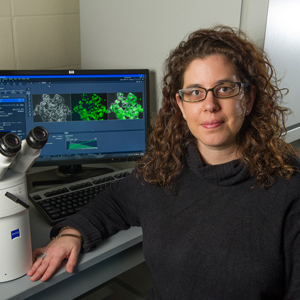Athanasia Panopoulos

Elizabeth and Michael Gallagher Assistant Professor, Department of Biological Sciences
Phone: 574-631-9624
Office: 271 Galvin Life Sciences Center
Athanasia Panopoulos’ laboratory conducts research on induced pluripotent stem (iPS) cells with a focus on how the process of reprogramming somatic cells– the adult cells in the body such as skin, hair, blood, and other tissues– could open new ways to treat cancer and blood diseases.
Panopoulos’ research combines her training in stem cell biology, blood cell development and cancer to utilize the process of reprogramming to address two main long-term goals: (1) To study the development of human blood stem cells in hopes of making blood stem cells in a dish that are capable of fully reconstituting the entire blood system. Although human pluripotent stem cells, such as iPSCs, have the potential to differentiate into any cell lineage in the human body, researchers have not yet been able to obtain fully functional cells for some cell types, including the hematopoietic stem cells (HSCs) that make blood. Why blood? If scientists were able to successfully make blood stem cells, then it is the hope that patients in need of a bone marrow transplant would no longer have to wait to find a bone marrow matched donor, and numerous blood diseases could be treated in ways they were not able to before, and (2) To develop methods to strategically target cancer cells that behave as stem cells. It is thought that for some types of malignancies, cancer cells that acquire “stem cell” properties are contributing to relapse. Reprogramming allows the ability to study how cancer cells may be doing this, in hopes of being able to target these cells and prevent malignant relapse.
Would you like to support Prof. Panopoulos’ Research?
Recent Papers:
- D'Antonio M, Woodruff G, Nathanson JL, D'Antonio-Chronowska A, Arias A, Matsui H, Williams R, Herrera C, Reyna SM, Yeo GM, Goldstein LSB, Panopoulos AD, Frazer KA. High-throughput and cost-effective characterization of induced pluripotent stem cells. Stem Cell Reports 8:1101-1111 (2017).
- Panopoulos AD*, Smith EN*, Shepard PJ, Arias A, Modesto V, Diffenderfer K, Hishida Y, Rao F, Biggs W, Sandoval E, Conner C, Berggren T, O’Connor DT, Izpisua Belmonte JC, Frazer KA. Aberrant DNA methylation in human iPSCs associates with MYC binding motifs in a clone-specific manner independent of genetics. Cell Stem Cell 20:505-517 (2017).
- Panopoulos AD, D’Antonio M, Arias AD, Benaglio P, DeBoever C, Williams R, Garcia M, Nelson B, Harismendy O, Grinstein JD, Drees F, Okubo J, Diffenderfer KE, Hishida Y, Modesto V, Dargitz CT, Feiring R, Zhao C, Jepsen K, McGarry TJ, Matsui H, Reyna J, Aguirre A, Rao F, O’Connor DT, Yeo GW, Evans SM, Chi NC, Goldstein LSB, Izpisua Belmonte JC, Berggren WT, Adler E, D’Antonio-Chronowska A, Smith EN, Frazer KA. iPSCORE: A resource of 222 iPSC lines enabling functional characterization of genetic variation across a variety of cell types. Stem Cell Reports 8:1086-1100 (2017).
- Panopoulos AD*, Yanes O*, Ruiz S, Kida YS, Diep D, Tautenhahn R, Herrerias A, Batchelder EM, Plongthongkum N, Lutz M, Berggren WT, Zhang K, Evans RM, Siuzdak G, Izpisua Belmonte JC. The metabolome of induced pluripotent stem cells reveals metabolic changes occurring in somatic cell reprogramming. Cell Research 22:168-177 (2012).
- Panopoulos AD, Izpisua Belmonte JC. Induced pluripotent stem cells in clinical hematology: potentials, progress, and remaining obstacles. Review. Current Opinion in Hematology 19:256-260 (2012).